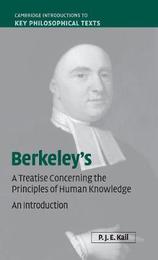
|
Berkeley's A Treatise Concerning the Principles of Human Knowledge: An Introduction
Hardback
Main Details
Description
George Berkeley's Principles of Human Knowledge is a crucial text in the history of empiricism and in the history of philosophy more generally. Its central and seemingly astonishing claim is that the physical world cannot exist independently of the perceiving mind. The meaning of this claim, the powerful arguments in its favour, and the system in which it is embedded, are explained in a highly lucid and readable fashion and placed in their historical context. Berkeley's philosophy is, in part, a response to the deep tensions and problems in the new philosophy of the early modern period and the reader is offered an account of this intellectual milieu. The book then follows the order and substance of the Principles whilst drawing on materials from Berkeley's other writings. This volume is the ideal introduction to Berkeley's Principles and will be of great interest to historians of philosophy in general.
Author Biography
Dr P. J. E. Kail is University Lecturer in the History of Modern Philosophy, University of Oxford and Fellow and Tutor in Philosophy at St Peter's College, Oxford. He is co-editor with Marina Frasca-Spada of Impressions of Hume (2005) and author of Projection and Realism in Hume's Philosophy (2007).
Reviews'... this book excels in offering readability, clarity and well-judged analytical details. It should be a great asset not only to students of Berkeley or early modern philosophy but to the full-time academic researcher in these fields (and other fields) too. In this reviewer's judgement, Kail has produced the best currently available single-volume introduction not just to the Principles, but to Berkeley and his philosophy in general.' Alasdair Richmond, The Philosophical Quarterly
|